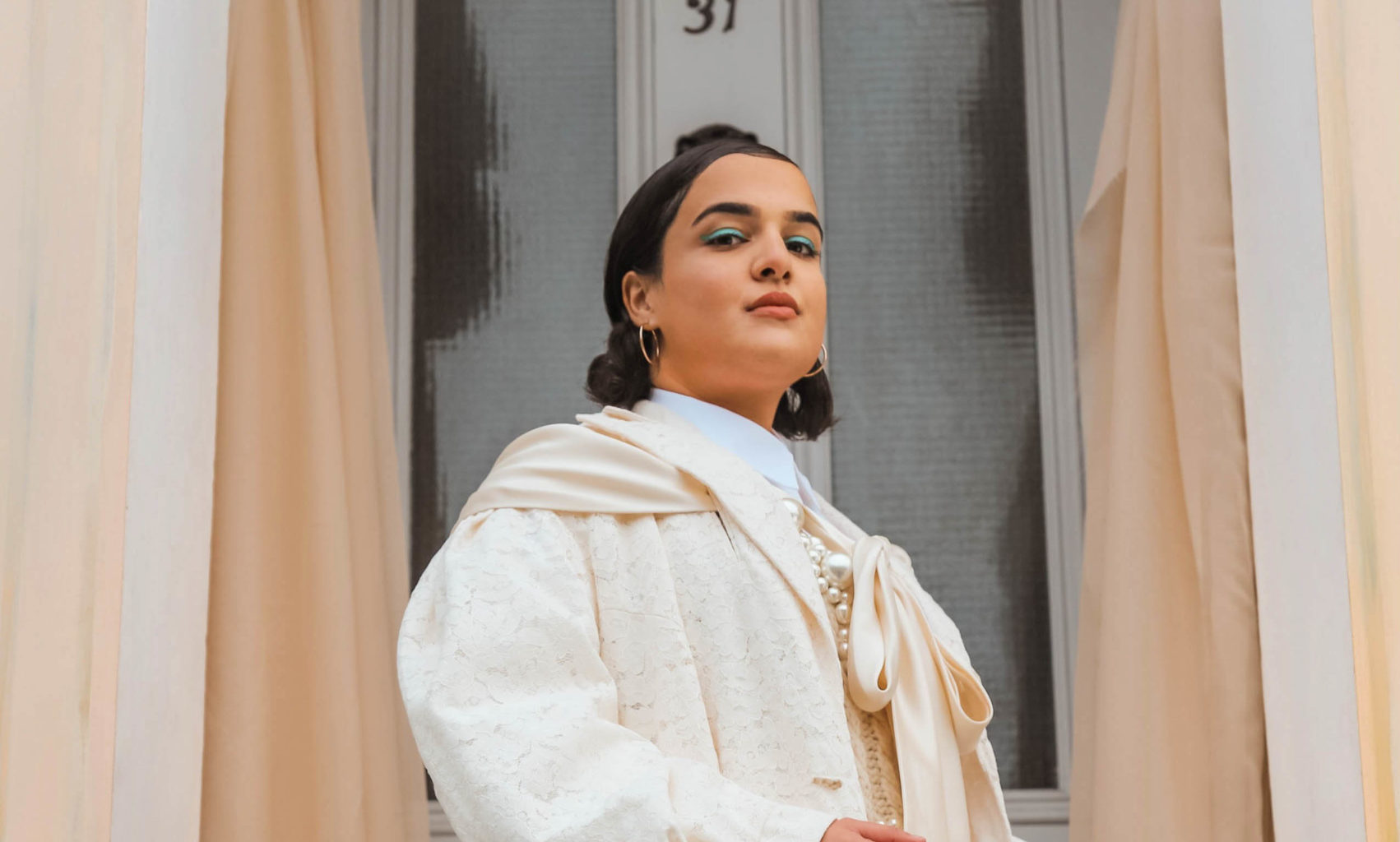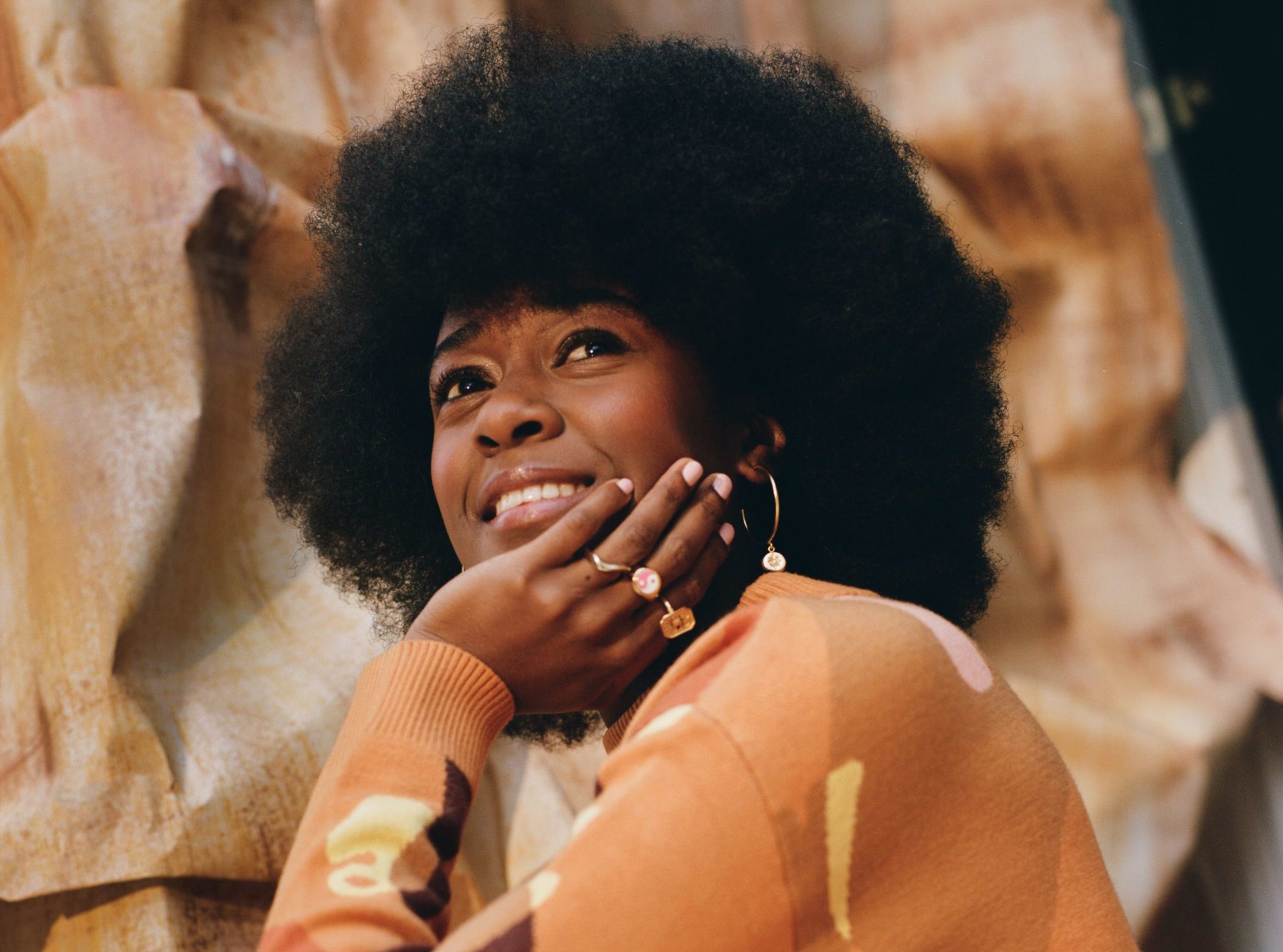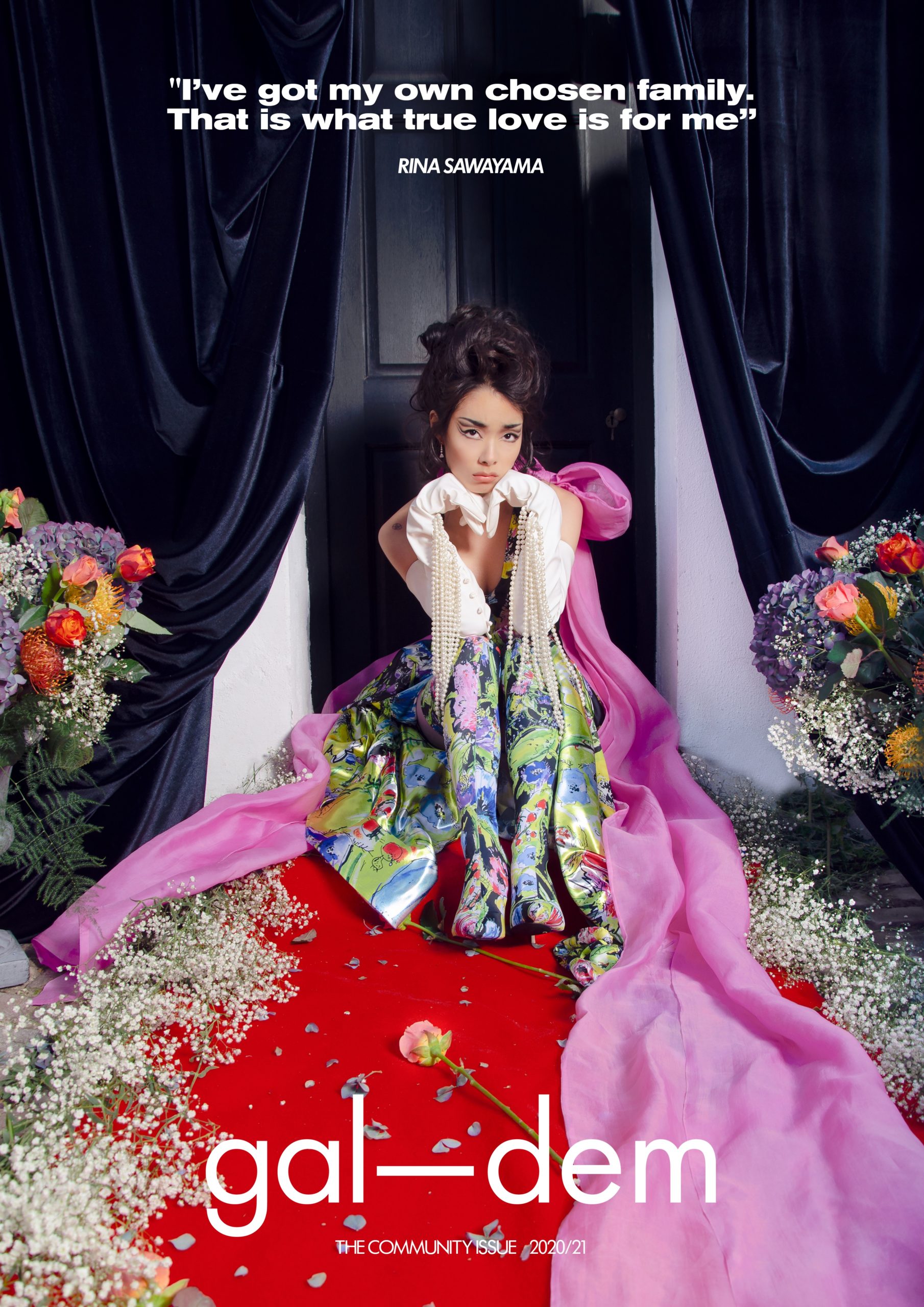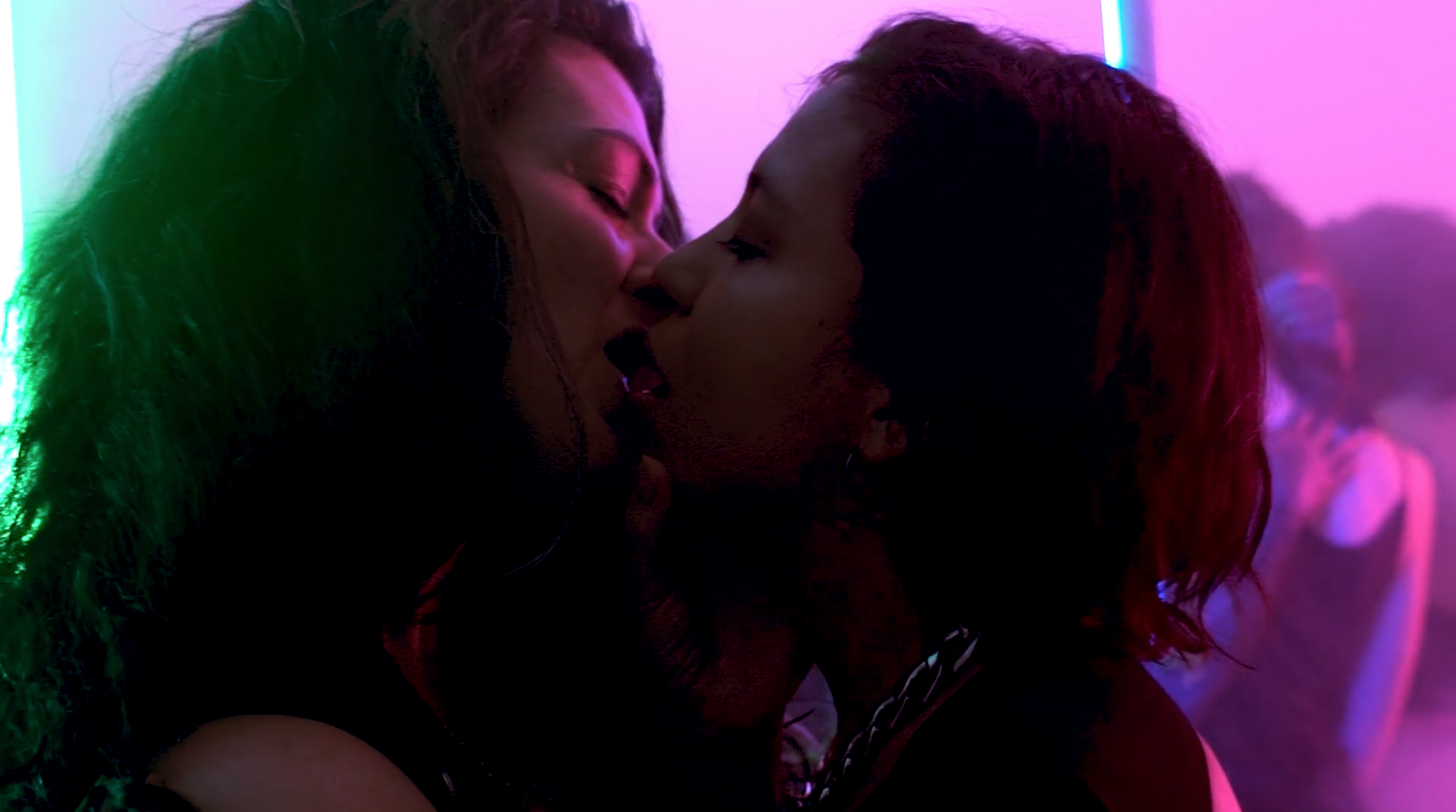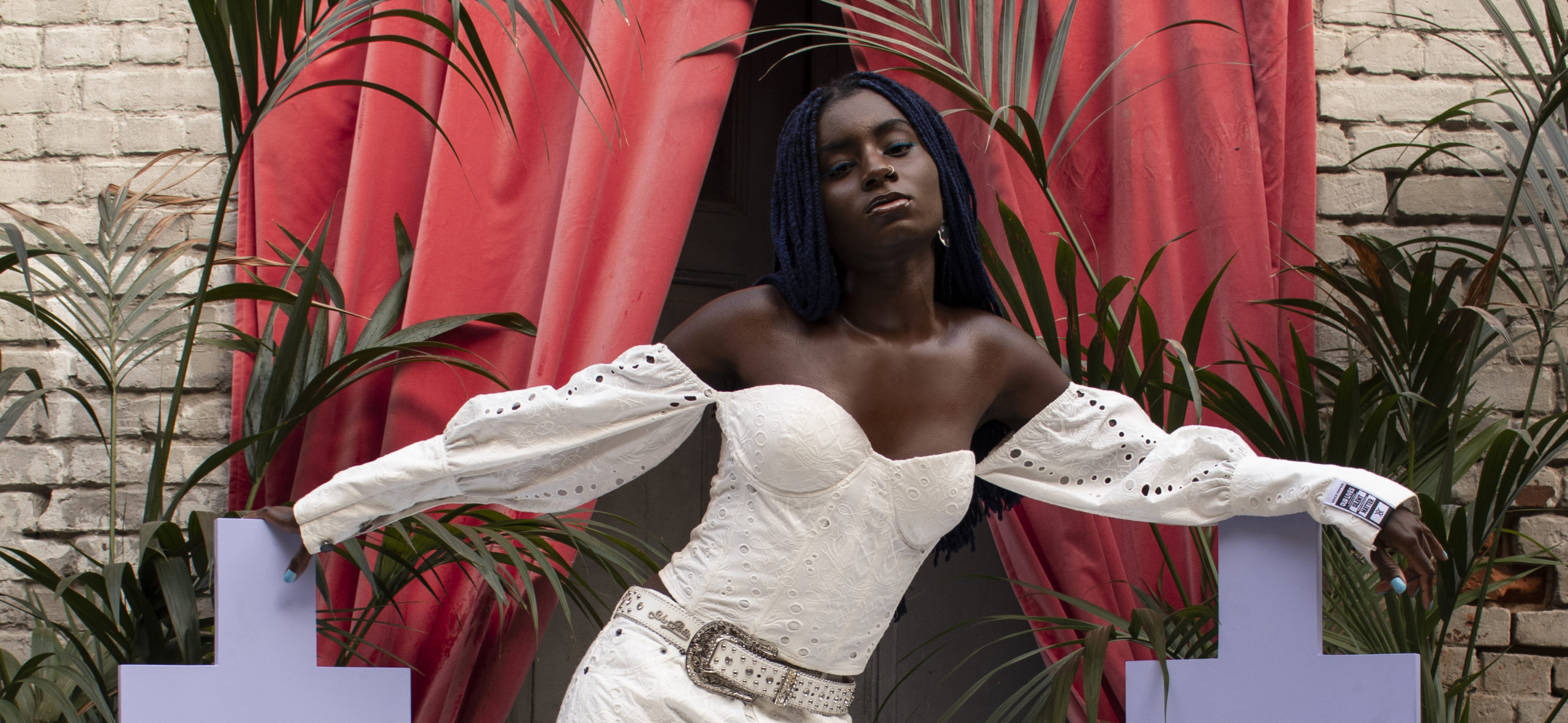
Joanna Legid
‘I inspired a lot of black women to start rollerskating’ – Oumi Janta wants you to dance
Exploding onto our timelines, the Berlin-based skater is bringing laughter, light and the legacy of black rollerskaters to the floor.
Olamiju Fajemisin
10 Dec 2020
“I can just be myself when I skate. I don’t have to pretend. You know what I mean?”
I do know what she means. I’m speaking to Oumi Janta over video call and, occasionally, the 29-year-old sends her cobalt wool braids spinning around her as she shoots her arms up in the air to try and find the words to describe her incredible year.
Before the pandemic hit, Oumi could often be spotted skating on Tempelhofer Feld consumed in the world of her movement. She would glide along the flush asphalt, drifting between friends as they shot short videos for her growing Instagram page.
It was on account of these videos that Oumi’s life would change entirely. She went from being a locally-known icon of the Berlin summer to a globally adored symbol of genuine carefreeness. “Every summer, even on days when I was working, I would try and go onto the feld and just enjoy the last bits of the sun, the last hours of the day,” she tells me with a palpable relaxedness. As we come to the end of a truly remarkable, dolorous year, it only makes sense that almost a million people would want to tap into Oumi’s joie de vivre. “It’s really nice to just enjoy time … not rushing too much. Just enjoy life for a second. Don’t look at the time. How late is it? We don’t care! Just skate, let’s start. And now it’s dark, so let’s go home,” she says.
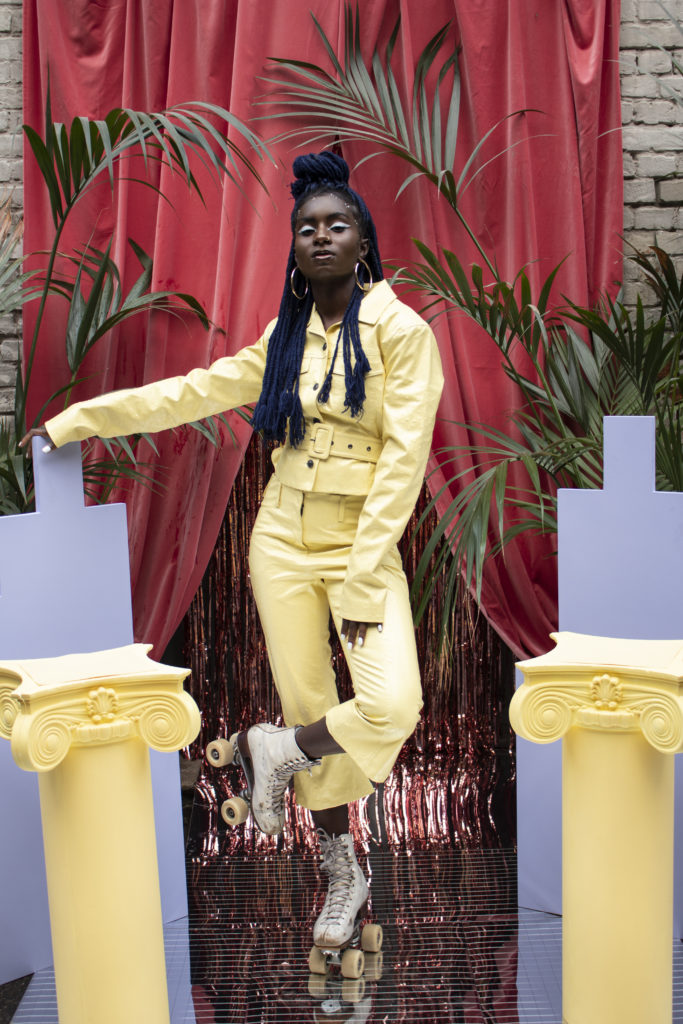
Oumi Janta wears yellow jumpsuit by Daily Paper, vintage earrings and rollerskates, models own
Sometime in spring, I was doomscrolling on Twitter before doing a double-take, and scrolling back up to hover over a video of a woman jam skating. She danced so languidly; like liquid on her eight wheels. It was Oumi. Jam skaters move with gymnastic changeability, engaging their entire bodies to execute complicated combinations all the while remaining poised. The exact origin of the style is disputed but is generally reported to have emerged in Florida, and the Canadian-American Great Lakes region in the 1990s, pioneered by young Black American skaters who translated breakdancing onto wheels.
The same video circled back to me a couple days later. It had been originally posted by Scandal actor Kerry Washington and was garnering clicks at breakneck speed. Before long, millions of people across the world would seek respite from the pandemic world in Oumi’s videos, which have since been shared by the likes of Viola Davis and Alicia Keys. They are, quite simply, a pleasure to watch. Uncomplicated studies of joy personified; Oumi’s playful happiness seems to leak from the screen. “Here’s a video that has made me all fuzzy inside,” posted one Twitter user alongside the now-iconic video of Oumi freestyle skating in a striking yellow co-ord on a sunny day.
Oumi tells her story with such calmness – though her path to four-wheeled glory wasn’t as straightforward as one might think. Speaking frankly, she cites her parents’ separation as the catalyst for a series of events that eventually led her to dedicate her time to skating. “When you’re a kid it puts you under a lot of stress and pressure. Parents fighting. Everything. So I tried to hide myself in creative things,” she says, before listing a number of typical childhood hobbies. “I liked ice skating, you know, the movements, making big, round shapes,” she says, drawing a circle around her head with her arms.
“When your parents separate as a kid it puts you under a lot of stress and pressure, so I tried to hide myself in creative things”
“Do you know Surya Bonaly?” I ask.
“She didn’t fit into the jury’s imagination,” Oumi replies. Any Black girl who has ever loved skating—whether on or off the ice—knows Bonaly’s name. In 1998, at the Nagano Winter Olympics, the French former competitive figure skater, three-time World silver medalist and five-time European champion, became the only figure skater to land a backflip on one blade. It was her third Olympics. She was still recovering from an injury and, already knowing that she would not place for a medal, opted instead to “leave a trademark” and perform a “Bonaly”, her signature (yet illegal) move.
The then 24-year-old finished tenth. She retired from competition later that year. Her legacy of formidable talent and athleticism remains entangled in the legend of her exceptionalism, which itself was soiled by misogynoir. Like me, Oumi only learned of Surya’s existence belatedly. “I just – I didn’t know! I just didn’t know. If I did, maybe she could have been like a role model for me.” Before long, Oumi left ice skating behind, along with most sports. “I kind of lost it, like, the ‘sporty’ thing. I was more driven to paint and draw.” It was only when, years later in 2014, Oumi, then an industrial design undergraduate, happened upon a roller disco with friends that she picked up skating again. It stuck that time around.
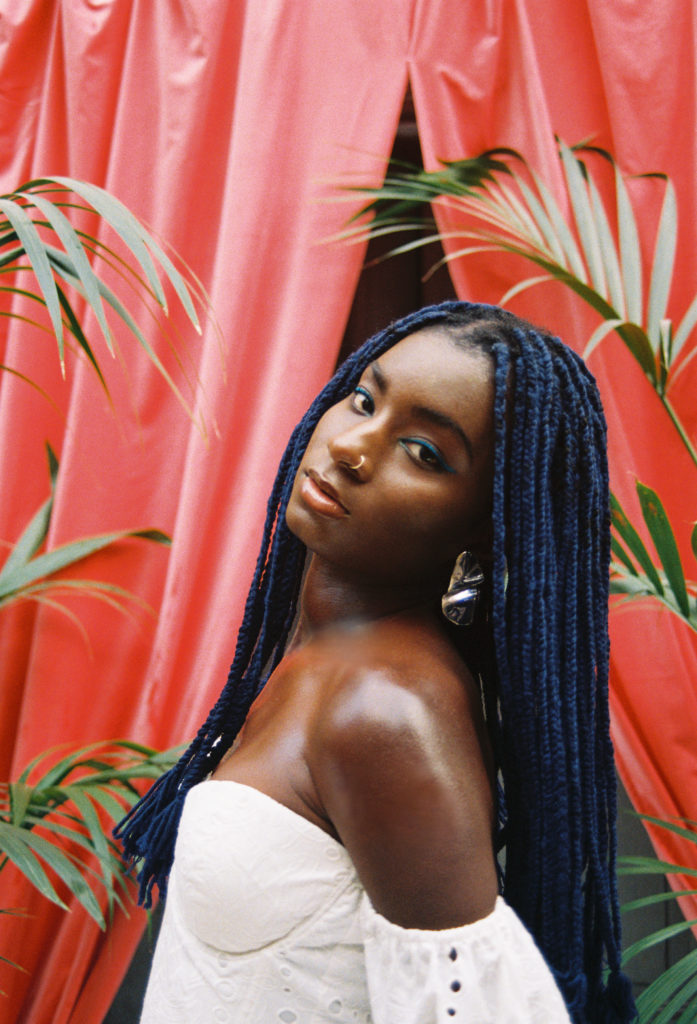
Oumi Janta wears white trousers and top by Daily Paper, belt by Saks Potts, earrings by Cult Gaia, shoes models own
Roller skating has a segregated history, too. Just shy of a hundred years after James Leonard Plimpton patented the design for the first quad skate, Kyle Black’s grandparents opened Detroit’s Rollercade. The Rollercade was the first African-American owned skating rink in the US, it welcomed Black skaters every night, rather than just on euphemistically named “soul” or “adult nights.”
As Dyana Winkler, co-director of the 2019 documentary United Skates explains, it is the persistence of Black skaters that nurtured the culture of care and kindredness still tangible in skating today. “It’s not just skating. It’s the children that are being watched by those around them. It’s the grandparents that are playing dominoes and go to listen to the music. It’s a whole community that is taking care of each other.”
“There’s nothing else like it,” Oumi says, recalling the first time she witnessed a community of skaters dancing and rolling around each other at an event at an indoor rink one night. Now, she’s holding space for wannabe skaters to share in that feeling.
“Behind me, things disappear, and fall down, and explode, but there’s nothing I can do about it. Just gotta be as happy you can”
Last May, Oumi quit her job as a marketing assistant. “I was broke as hell – In the red,” she laughs, “but I did it.” She made skating her full-time job and launched the Jam Skate Club, an all-age, all-background, all-gender skate school where she and two other volunteer coaches, OG and Bertini, teach jam skating, artistic roller skating, and more to curious beginners and intermediate learners.
“I found a new venue and made a website. We had so much fun. There was dope music, disco lights. That’s the vibe I wanna have,” she gushes. “People learned a lot. I had a waiting list as well! Skating in summer and being with that community, it was just a nice time.”
Things were going well. She saved enough money for a return ticket to Senegal, where she was born and raised for six months before her family emigrated to Germany. “I needed to go,” she hadn’t been there in almost eight years. “When I came back in January [2020], that’s when it started. I heard ‘corona’ for the first time, and then lockdown. All jobs cancelled. I’d spent my savings on the trip. I had nothing. No income. So what comes next?”
Oumi thought back to her postgraduate employment. “I learned a lot from her. She was an independent freelancer, so I was working at her place. She made me realise it was possible. She had to start somewhere too, taking lots of little steps until she made it to where she is today. It made me more…” Oumi trails off, and hesitates briefly. “It made me more mütig.” she says, meaning brave. She applied for emergency government assistance, which “didn’t last long, only two or three months,” she tells me, “but at least it was something.” In between filling out stacks of paper, Oumi would go and do what brought her peace – skating on Tempelhofer Feld. “I just wanted to embrace the time I could spend skating,” she tells me. “There was nothing else I could do… Behind me, things disappear, and fall down, and explode, but there’s nothing I can do about it. Just gotta be as happy you can.”
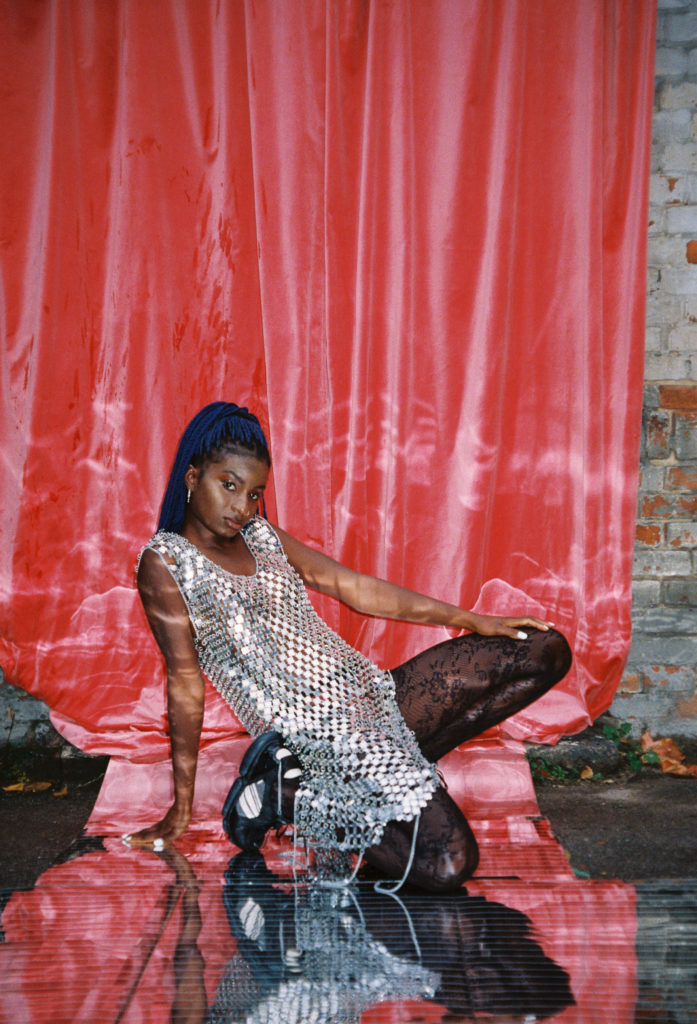
Oumi Janta wears dress by Paco Robane via Solastseason Berlin, tights by Saks Potts and trainers Adidas x Oamc
The community gravitating around Oumi is one of fans and skating converts alike. “I get a lot of comments from people telling me that I inspired them to start skating. A lot of Black women my age,” she says. But the sage advice she offers extends beyond beginner’s skating. Her uncompromising can-do attitude seems to demystify some of life’s complexities. “If you want to learn something new, you have to open your mind. Try it. Just be careful in the beginning.” she tells me, smiling. “Don’t start scared.”
“I’m just being myself. But people already have [fully-formed ideas] of who I am [before they even meet me], because they see my videos … see me dancing.” Her visible exuberant joy for life is comforting and familiar. It’s uncomplicated and refreshing, especially during a time like this. But what happens when the world picks up on that?
“If you just dance alone, there’ll come a time when you don’t know what to do”
“Well, now it’s good. But, the first month wasn’t great,” she admits. “I mean, I was happy that it happened, but I wasn’t in a good place. It was too much for me.” The “it”, of course, being her experience of viral fame. “I had 50,000 followers. I was used to seeing this number. It felt comfortable. Okay, 50,000. But then 100,000 … one more zero.” She looks worried for the first time in our conversation. “Who are those people? What do they expect from me?” At the time of our conversation, more than 927,000 accounts follow @oumi_janta; the number continues to inch higher. “You need time to get used to things,” she says. “I am really happy that I still have the friends I had before. They’re here, they call me. I have some backup.”
Oumi knows that, as a teacher, it is paramount she continues her own education. She sticks a finger up as she lists off her priorities, “More classes, meet new people, skate, see the world.” Once it is safe to do so, she wants to go to Atlanta to meet and skate with the jam skaters who inspired the style she’s now popularising in Berlin. “I want to learn,” she tells me.
“If you just dance alone, there’ll come a time when you don’t know what to do. You would have just been doing the same thing!” she says, gesturing into her webcam. “I think that human beings are driven to seek out differences and try different things. I wanna learn new moves.” For Oumi Janta, this year was just the beginning. “I never want to get used to things,” she tells me with a grin.
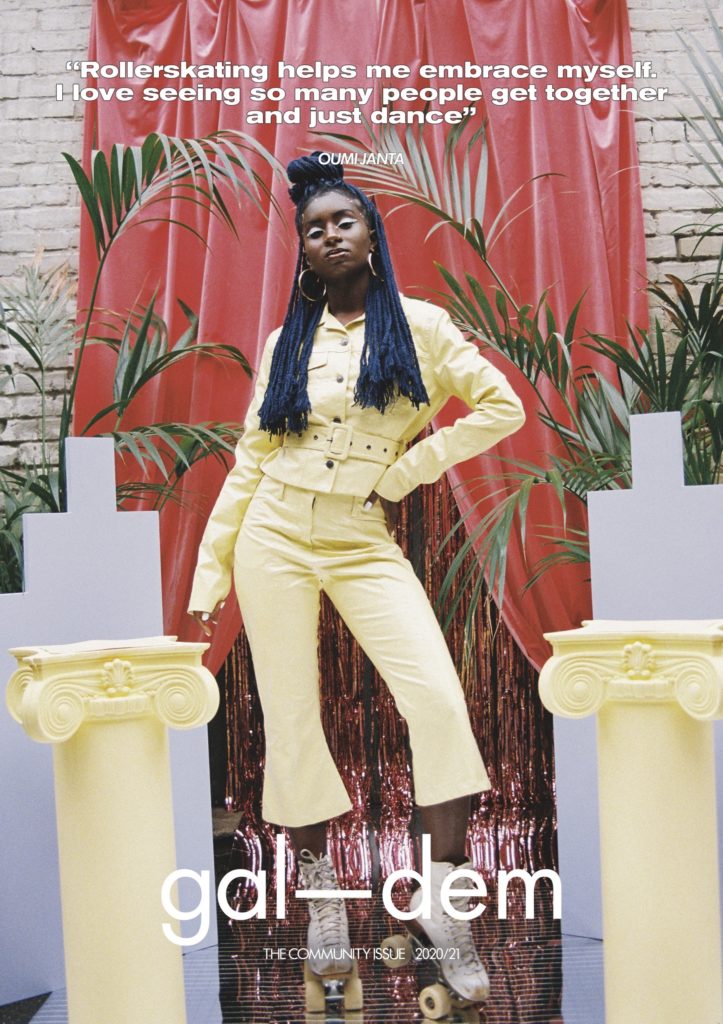
‘I inspired a lot of black women to start rollerskating’ – Oumi Janta wants you to dance is the fifth release of gal-dem’s 2020 community covers. This year we’re saluting the people who have helped to foster, support, and build communities. You can support the gal-dem and purchase our beautiful cover prints here; they would make a great Christmas present!
PRODUCTION CREDITS
Photographer: Joanna Legid
Set Designer: Ruth Bartlett
Stylist: Olive Duran
Hair/MUA: Rim Zemuye
gal-dem producers: Niellah Arboine, Bijal Shah, Charlie Brinkhurst-Cuff

